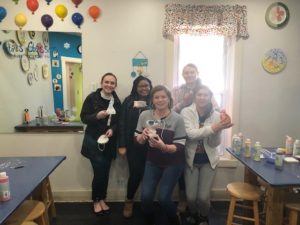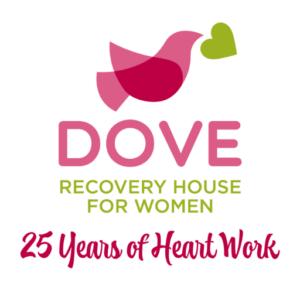When a woman comes to Dove House, she is often at the end of her rope. While this shows up in emotions such as sadness, anger, fear or indifference, there’s usually a common theme—she’s lost a

sense of self. Deep down, it’s hard to recognize who she really is.
With substance use disorders, this isn’t uncommon. People get lost behind the wall of numbness that drugs and alcohol give them, and in time, they become unrecognizable even to themselves.
At Dove House, we meet our clients where they are and open the door to self-rediscovery. There are a series of four groups geared to meet women’s needs and the first one is called Stages of Change. This first phase of programming is designed to help peel back the layers of each client. And to do this, our caring, compassionate and highly skilled team leads the way.
Dove House Clinical Director Lindsay Camplin oversees the clinical programs and, and while she holds impressive credentials including being a Licensed Clinical Social Worker (LCSW) with a Master of Social Work degree, she believes the clients are the real experts.
“We are really here to help guide them back home to themselves,” said Lindsay.
And to do this, they start with the basics to help lay the foundation of recovery. Stages of Change is ten weeks long and a client must complete this phase before moving on to phase two, which is the intensive outpatient program (IOP). In Stages of Change, Dove House clients learn to:
- believe in themselves
- identify their values
- understand the biology of addiction
- recognize the importance of physical health
- practice basic coping skills
In addition to group therapy, the therapists also implement therapeutic techniques such as art therapy, journaling and other hands-on approaches to help clients understand the modules more thoroughly. Ultimately, the hope is that clients will begin to gain a deeper understanding of themselves and a desire for a life in recovery.
“In addiction, and so often the experiences of trauma that underlie addiction, people are taught that they don’t get to be a person,” said Lindsay. “Here, they learn how to reconstruct and rebuild their lives, and learn how to come back home to who they are as a person.”
A special component of this phase happens during the very first week. The residents write a letter to their future self. The letter is tucked away for several months until they graduate from Dove House IOP programming, and when they do, they read their letter at a graduation ceremony—an experience that can be described as surreal for the woman who can barely recognize the person who wrote that letter months earlier when she first walked through the doors of Dove House.



